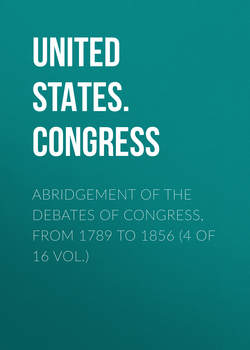Читать книгу Abridgement of the Debates of Congress, from 1789 to 1856 (4 of 16 vol.) - United States. Congress - Страница 93
ELEVENTH CONGRESS. – FIRST SESSION.
PROCEEDINGS AND DEBATES
IN
THE HOUSE OF REPRESENTATIVES. 6
Thursday, May 25
ОглавлениеSwedish and Portuguese Vessels
Mr. Newton offered a resolution to instruct the Committee of Commerce and Manufactures to inquire into and report on the expediency of permitting vessels of those nations with whom intercourse was permitted, to take cargoes, &c. He stated to the House that at present vessels of Sweden and Portugal, with whom intercourse is permitted, could not load and depart; and on this subject a letter was read from the Secretary of the Treasury to the Committee of Commerce and Manufactures.
Mr. Burwell said there was another subject connected with the resolution, which ought to be taken into consideration. The proclamation of the President declares that on the 10th of June next, the operation of the non-intercourse law, as relates to Great Britain, shall cease. It went into operation on the 20th of this month. Of course there were many vessels on the coast which could not get in before the 20th of May. He submitted it to the Chairman of the Committee, whether it would not be proper at once to do away all restriction, because the policy of its existence had ceased in relation to Great Britain from the restoration of harmony with her; and if the goods on our coast were not permitted to be regularly landed, they might be smuggled in, and injure the revenue. He thought it would be proper to inquire into the expediency of doing away at once, by law, all interdiction of commerce.
Mr. Newton said he had no objection to act on the subject mentioned by his colleague, but he did not conceive it to be connected with the present motion.
Mr. Newton's motion having been agreed to, he immediately reported "a bill respecting the ships or vessels owned by citizens of foreign nations with whom commercial intercourse is permitted." – Twice read, and referred to a Committee of the whole House to-morrow.
Non-Intercourse Act
Mr. Livermore said that he did not distinctly hear all that fell from the gentleman from Virginia, (Mr. Burwell,) but, from what he had heard, he apprehended that it was on a subject of great importance. There were many vessels on the coast, which, were they to enter our harbors, would fall within the description of the 4th, 5th, and 6th sections of the non-intercourse act. From the happy commencement of the settlement of our differences with Great Britain, he did not believe it was the design of any gentleman that the non-intercourse should be enforced in this particular. He therefore offered a resolution for suspending the act, as follows:
Resolved, That it is expedient that the operation of so much of the act, entitled "An act to interdict the commercial intercourse between the United States and Great Britain and France, and their dependencies," as inhibits the importation of goods from Great Britain and its dependencies, be suspended until the tenth day of June next.
